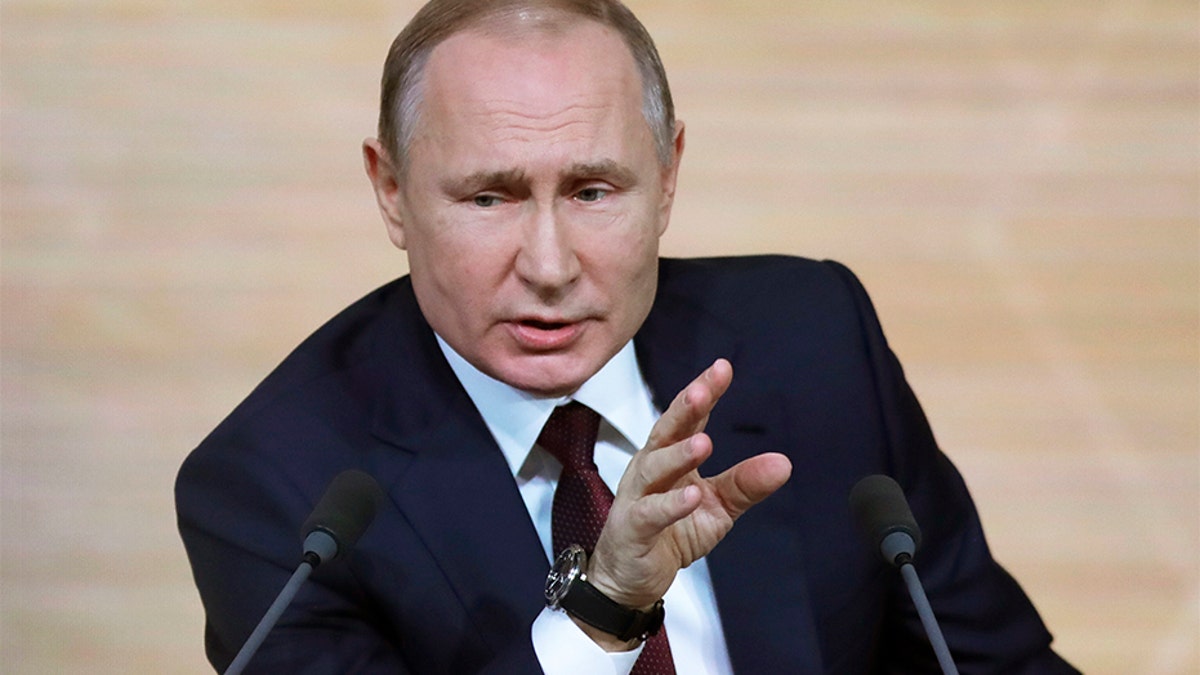Fox News Flash top headlines for Dec. 20
Fox News Flash top headlines for Dec. 20 are here. Check out what's clicking on Foxnews.com
In December 1999, I was based in Russia for Fox News. On New Year’s Eve, we were all busy getting ready to cover Moscow’s millennial celebrations while remaining vigilant for any Y2K meltdowns, when then-President Boris Yeltsin stopped us all dead in our tracks with an announcement we did not expect: He was handing power over to his Acting Prime Minister, Vladimir Vladimirovich Putin. That was almost twenty years ago.
This week, I went back to Moscow for Putin’s year-end press conference. As I got into a taxi and asked to be taken to the World Trade Center, the driver asked coyly what my business there was. I replied, “Putin.” He hissed, “Can we trade him in?” There followed a lengthy rant about poverty and corruption in Russia, an oil-rich state where the driver said, “there should be plenty to go around.” Instead, he proclaimed, all Russia’s wealth went into the pockets of a relative few. He missed the old Soviet Union and the certainty that came with it.
Life in Moscow has become terribly efficient and accommodating in recent years, with often cheerful customer service and a can-do attitude that didn’t exist in Soviet years. At the Starbucks on Tverskaya Street which like all others, takes your name before preparing your drink, a barista called out, “Have a nice day, Amy!” as I headed off with my coffee into the pitch black of a Russian winter morning. The champagne glass-shaped street lights still sparkled. Moscow was decorated to the hilt.
The annual press conference is a day-long commitment. Nearly 2,000 journalists trickle into the Trade Center from 8 a.m., and the Kremlin lays out a generous breakfast spread. My recollection was salami sandwiches and little cabbage pies were served among other snacks, but I also recalled from my last visit that it is very hard to get a seat for the main event, so I skipped the buffet in order to secure a good place in the line that was forming outside the conference hall. We waited for a few hours before being let inside, where the free-for-all for seats began.
Among those hoping to get a bit of attention for themselves or their chosen issues was a woman in a hard hat and another dressed like a tsarina (it often feels a bit like the Village People meets Vladimir Vladimirovich at this event). There were two young people with hair dyed in bright colors who told me they hoped to ask Putin how he avoided being sad.
“Do you think he’s depressed?” I asked.
“Have you looked at him lately?” was the reply.

Russian President Vladimir Putin gestures during his annual news conference in Moscow, Russia, on Thursday. (AP)
Putin’s approval rating is at 70 percent, a figure many outside observers presume is inflated or skewed. But there is no disputing that the Russian leader has wide support. Strong opposition is not tolerated, so it’s not certain he would have held on to power for twenty years under different circumstances.
At his press conference, Putin tried to play down his controversially long reign, pointing out that he was Prime Minister for four of those years. He did say it might be appropriate to change Russia's constitution to say no president can serve more than two terms, as opposed to the current limit of "two consecutive terms." That clause is why Putin was able to be President, switch jobs with the Prime Minister and then return to the Kremlin. One Russian analyst said his suggestion could be about blocking anyone in the future from becoming as strong as he is.
One question to Putin concerned Russia forming a new state by merging with Belarus. Speculation is rife that Putin might become president of a new state and nothing could legally stop him. He wouldn’t be drawn on the topic.
I wanted to ask Putin what he thought about the concept of impeachment, as his press conference fell on the day after the U.S. House of Representatives impeached President Trump, but he didn’t call on me. In the nearly four and a half hours he fielded questions, I didn’t hear him call on anyone from an American media organization. He mostly chose to engage domestic reporters but representatives from China, Turkey, Japan, Germany, and the U.K. did get a word in edgewise. Many of those overlooked became noisy, boisterous and towards the end waved signs noting their affiliations or pet causes ever more frantically. The man behind me kept shouting at Putin, “You promised to talk about Iran!”
PUTIN: 'FAR-FETCHED' IMPEACHMENT OF TRUMP WILL END IN THE SENATE
Putin was, in fact, asked about Trump’s impeachment to which he replied the Senate would be “unlikely to remove a representative of their own party from office on what seems to me an absolutely far-fetched reason.” He also described the American controversy as internal political fighting, saying: "The party that lost (the 2016) election is trying to retrieve results by other means," and opining that Democrats couldn’t get Trump on alleged Russian collusion, they had to invent a story about some pressure on Ukraine.
Political analyst Masha Lipman told me that Trump's impeachment suits the Kremlin, which would prefer to see America weak and regards U.S. domestic turmoil as a relief. She is skeptical that U.S.-Russian relations will improve anytime soon.
"I think should Trump be re-elected, the anger of the Democratic establishment would be even stronger," she said. "Russia is their focus. Russia has been used as a battering ram against Trump."
Putin again brushed off suggestions of election interference Thursday, this time in last week's British vote. He was also asked if he was offended that British Prime Minister Boris Johnson had once likened him to Dobby the House Elf from the "Harry Potter" books.
"I know what my country’s interests are,” Putin said, “and whatever anyone has said about me has no importance when compared to the fundamental tasks Russia is interested in solving." Applause erupted in the room.
CLICK HERE TO GET THE FOX NEWS APP
Lipman said that one of the goals of this press conference is to show that Putin fully in control. Just a few hours after the press conference broke up, news broke of a shooting outside the FSB (Federal Security Service) headquarters in central Moscow that killed at least two security officers. At the time, Putin was inside the Kremlin listening to a concert to mark the day to honor those who work in security services. He had just told them: “Extremism in any form is a threat to our democracy, human rights and freedoms. Security must be preserved.”
As it stands, Putin has four more years to play the strongman unless any other changes to the constitution are made. There is a lot of talk and speculation about how the next chapter of Russia’s story will go. Few Russians I met, either inside that press conference or out, claim to have a crystal ball.


